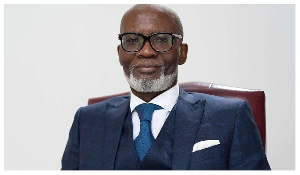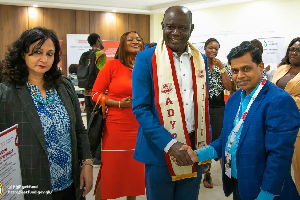…As Honourable Alban Kingsford Sumanu Bagbin prepares to storm Privilege Committee of the Ghanaian Parliament to forcefully distinguish Lobbying from Bribery and Corruption over an allegation that the Honourable lawmakers take bribes but not undisclosed gifts as part of their duties?
BRIEFS & MEMO
“The British parliamentary expenses scandal began in May of 2009, when the Daily Telegraph newspaper began publishing previously-secret information about MPs’ allowances and expense claims. Much of the public outcry focused on the fact that taxpayers had been unwittingly paying for what seemed like extravagant expenses that had little to do with MPs’ official duties; this type of claim was perhaps epitomized by the floating duck house purchased by Sir Peter Viggers (Conservative MP for Gosport) for his pond and reimbursed at taxpayers' expense. In other cases, attention was focused on expense claims that were not so much extravagant as fraudulent: for example, several MPs managed to use a second-home allowance to pay for improvements on two houses by repeatedly switching the designation of their primary and secondary homes. At a time of economic recession and austerity budgets, these abuses struck a nerve with voters, who indicated in surveys that they would severely punish implicated MPs in the upcoming general election.” [1] In this article Asante Fordjour seeks to assess whether the purported give-and-take dealings of our MPs as reavealed by Hon. Alban Bagbin, constitute bribery and corruption or a legitimate lobbying outcomes, as we are being made to believe.
INTRODUCTION
According to Legal-Dictionary, lobbying involves the advocacy of an interest that is affected, actually or potentially, by the decisions of government leaders. Individuals and interest groups alike can lobby governments, and governments can even lobby each other. “The practice of lobbying is considered so essential to the proper functioning of the U.S. government that it is specifically protected by the First Amendment to the U.S. Constitution: “Congress shall make no law … abridging … the right of the people peaceably … to petition the Government for a redress of grievances.” The practice of lobbying it is said, “provides a forum for the resolution of conflicts among often diverse and competing points of view; information, analysis, and opinion to legislators and government leaders to allow for informed and balanced decision making; and creates a system of checks and balances that allows for competition among interest groups, keeping any one group from attaining a permanent position of power. Lobbyists can help the legislative process work more effectively by providing lawmakers with reliable data and accurate assessments of a bill's effect.”[2] When then, can a lobby be construed as bribery or corruption?
COMMENTRAY
Professor David Lanham- Professor of Law at the University of Melbourne has argued that it is difficult to find satisfactory definition of bribery at common law because the offence underwent a development over centuries and is often described in terms of a number of offences rather than a single offence [3]. According to Russell on Crime [4], bribery is the receiving or offering of any undue regard by or to any person whatsoever in order to influence his or her behaviour in (an official situation) and incline him or her to act contrary to known rules of honesty and integrity. Thus bribery is concerned with public rather than private functions. In the letter of Article 288* of the Constitution of the Fourth Republic of Ghana, a public officer is a person who holds a public office. This includes among others, public corporations other than those set up as commercial ventures; Art 190(1)(b), those established by the constitution, Art 190(1)(c); and such other public services the Ghanaian Parliament may by law prescribe, Art 190(1)(d).
Article 284* provides that the public officer shall not put himself in a position where his personal interest conflicts or is likely to conflict with the performance of the function of his office. So what does this mean if Daily Graphic Online [5] quotes Hon Alban Bagbin as saying: “The reality is that MPs are Ghanaians and there is evidence that some MPs take bribes and come to the floor and try to articulate the views of their sponsors?” “This is because in Ghana we have not developed what we call lobbying. There are rules; there are ethics regarding lobbying and we in Ghana think that lobbying is taking money, giving it to MPs and writing pieces for them to go articulate on the floor. That is bribery,” he adds. But this is not the first time such alleged hidden under-dealing is made public. In 12009 Hon PC Appiah-Ofori, a vociferous New Patriotic Party (NPP) Member of Parliament (MP) for Asikuma-Odoben-Brakwa, revealed that the sale of the Ghana Telecom to Vodafone Holdings BV was characterized by palms-greasing amount of $5000.00, to both sides of the political divide in the House.
It has come as no surprise that many well-meaning Ghanaians are calling not only for an independent committee to investigate the truth of the allegations being sporadically thrown in the air by leading honourables of government but also to make a conscious bid to establish whether it is honourable on the part of our MPs, elected not only to legislate for the State but also to scrutinize Parliamentary Bills and government policies, could be arguably, bought with gifts and inducements to act in the contrary. What makes this blemish worrying is the rather unfortunate, but never-ending helplessness shown by successive governments in prescribing correct medication despite a well-publicised bribery and corruption practices occasioning throughout our immediate past. And of course the complexities that such undisclosed or unrecorded transaction on the part of both the givers and the recipients is the norm.
Accordingly, we are pointed to the UK and the US where lobbying had well been legally defined. The term lobbyist has been traced to the mid-seventeenth century, when citizens would gather in a large lobby near the English House of Commons to express their views to members of Parliament. “By the early nineteenth century, the term lobby-agent had come to the United States, where it was applied to citizens seeking legislative favors in the New York Capitol lobby, in Albany. By 1832 it had been shortened to lobbyist and was widely used at the U.S. Capitol. In the early 2000s lobbyists practice their trade not only in the halls of the U.S. Capitol and the corridors of state legislatures, but also on playgrounds, in boardrooms, in manufacturing plants, at cocktail parties, and in retirement homes.”[2]
Contemporary lobbying methods include political action committees, high-tech communication techniques, coalitions among groups and industries sharing the same political goals, and campaigns to mobilize constituents at the grassroots level. “Lobbyists include schoolchildren who want to prevent their favorite neighborhood park from becoming a shopping mall, corporations who contribute to a particular legislator's campaign, lawyers who speak with legislators on behalf of their clients' business interests, cities who lobby the state legislature for changes in transportation laws, presidential aides who suggest new amendment language to congressional committee members, retired persons who want to save their government benefits, and many others. Each type of lobbyist attempts to win support for a particular point of view.” The exciting consolation down here in the UK is that w can monitor the voting patterns of our local MPS on crucial debated issues and more often than not, they consult not only with their constituents over their informed choices and where applicable, reconcile their conflicting interest.
To achieve the best for their constituencies, they don’t sit in dark to receive undisclosed brown envelopes. In the US, the contemporary practices are that the identities of lobbyists are not put under bushel. Samuel Ward, a well-respected lobbyist, it is told, was so successful at influencing legislators that in the mid-1800s Congress decided to investigate him. It is said that despite the noncorrupt success of lobbyists such as Ward, lobbyists during the mid-nineteenth century were often regarded as ethically questionable individuals. “This reputation was enhanced whenever lobbyists abused their position with improper practices such as bribing members of Congress.” It began efforts to reform lobbying in 1907, when it banned campaign contributions from banks and corporations. In 1911 proposed restrictions on domestic lobbying were first revisited, but these were not approved until 1946, when a law passed [6]
But in 1954 lobbyists challenged the Regulation of Lobbying Act for being unconstitutionally vague and unclear. In United States v. Harriss [7], the Supreme Court upheld the act's constitutionality but narrowed its scope and application. The Court ruled that the act applies only to paid lobbyists who directly communicate with members of Congress on pending or proposed federal legislation. This means that lobbyists who visit with congressional staff members rather than members of Congress themselves are not considered lobbyists. In addition, the act covers only attempts to influence the passage or defeat of legislation in Congress and excludes other congressional activities. Further, the act applies to and restricts only individuals who spend at least half of their time lobbying. In our instant case, we are unclear about those who are said to be allegedly, paying various sums of monies to our parliamentarians.
According to the 1946 US act, lobbyists to whom the law applies are required to disclose their name and address; the names and addresses of clients for whom they work; how much they are paid and by whom; the names of all contributors to the lobbying effort and the amount of their contributions; accounts that tally all money received and expended, specifying to whom it was paid and for what purposes; the names of all publications in which the lobbyists have caused articles or editorials to be published; and the particular legislation they have been hired to support or oppose. In addition, the act requires lobbyists to file registration forms with the clerk of the House of Representatives and the secretary of the Senate prior to engaging in lobbying. These forms must be updated in the first ten days of each calendar quarter for as long as the lobbying activity continues. Violation of the act is a misdemeanor punishable by a fine of up to $5,000 or a jail sentence of up to 12 months, and a three-year prohibition on lobbying.
On the face of this, it could be summarily concluded that the legislation sought to achieve nothing more than transparency and accountability which obviously, is in sharp contrast to what Honourables PC Appiah-Ofori and Sumanu Bagbin, appear to be telling the Ghanaian. Reward is something most us in Ghana could hardly perceive as bribe. Russell defines bribe in terms of regard- anything which is regarded or intended to be regarded as of value to the person bribed. According to Lenham [3], while money or tangible objects are the most obvious form of bribe, there is no reason why bribe should not take the form of intangibles like services nor where the bribe takes the form of a promise. So if our parliamentarians take a joyride or any for reward in anticipation influencing their legislative skills and honesty to favour an organization or an individual that could yes, amount to bribery or corruption.
The corresponding argument here is that assuming we go to court for justice and find that the judge sitting on the case has some sort of relation with our opponent or has vested interest in the matter the good conscience requires that s/he ought to rescue himself/herself from the adjudication of the case. It seems to me that if you are looking for an advocate, the best might not be your opponent’s sibling or even a friend. Affinity could comprise justice so in law, it is wise to know who is sitting on your case.
It has been found that since the 1940s, there has been continuing debate in the United States over the proper role of lobbyists in a democratic society. Whereas lobbyists forcefully contend that they offer a valuable service to legislators and government officials, providing information and raising questions about pending legislation or executive action, their numerous critics counter-claim that many lobbyists are nothing more than influence peddlers who seek political and legislative favors for their clients. [2]
“The perception that lobbyists and the interest groups they represent have corrupted the political process has led to state and federal legislation that regulates lobbyists. Nevertheless, a fundamental conflict remains over the extent to which government may regulate lobbyists and lobbying activities. Those opposed to restrictions on lobbying argue that the First Amendment guarantees the right of citizens to petition the government for redress of grievances. Placing restrictions on lobbyists impairs this right. On the other side, critics of lobbyists assert that regulations are needed to preserve the democratic process and to ensure the legitimacy of government. Many people have become cynical about politicians and government, perceiving that only lobbyists have access to the halls of power.” [2] In the UK, lobbying is the practice of individuals and organisations trying to influence the opinions of MPs and Lords. According to Methods of lobbying vary and can range from sending letters, making presentations, providing briefing material to Members and organised rallies. The starting point could be your MP [8].
The UK Transparency of lobbying, non-party campaigning and trade union administration Bill introduced in the House of Commons on 17 July 2013, makes provision in three areas: it establishes a register of professional lobbyists and a Registrar of lobbyists to supervise and enforce the registration requirements; it changes the legal requirements for people or organisations who campaign in relation to elections but are not standing as candidates or a registered political party and changes the legal requirements in relation to trade unions’ obligations to keep their list of members up to date. [9] In 1991, the US General Accounting Office found that nearly 10,000 of the 13,500 individuals and organizations listed in a popular lobbyist directory were not registered under the 1946 act which has had its critics. So in 1995 Congress passed a law where individuals who receive at least $5,000 in a six-month period from a single client are required to register with the clerk of the House and the secretary of the Senate, listing the congressional chambers and federal agencies they contacted, the issues they lobbied for, and how much money was spent on the effort. The reporting requirements also apply to organizations whose own employees lobby on their behalf and spend at least $20,000 in a six-month period on that effort [10].
Notwithstanding the reforms legislated in 1995, critics made additional bid, pointing out the irony of banning small gifts yet permitting senators and representatives to accept $5,000 donations for their campaign committees from political action committees controlled by lobbyists. The consequence is that now; it is the legislator who calls the lobbyist, for a political contribution. But lobbyists complain that the reforms have stifled the decades of relationships and among other legitimate requests, out of fear that it will produce political embarrassment which can impair the democratic process and a chilling effect on the exercise of citizens’ rights. But advocates of strict regulation contend that this is needed to prevent special interests from controlling the political process, to ensure ethical behavior on the part of MPs and government officials, and to enhance the public’s confidence in the government. In the US Act, the regulation, for example, does restrict traditional practices such as giving legislators and staffs tickets to sporting events, paying for meals and entertainment, and underwriting golf and skiing junkets.
It is argued that these practices have contributed to the public perception that gifts and favors buy access to legislators and sometimes even votes. In Williams v R [11], a charge of attempted bribery was brought under the Australian Commonwealth Crimes Act 1914, s. 73. Blackburn J (at 373) took the view that the requirement of corruption at common law implied an intention to procure a breach of duty on the part of the official bribed but no such limitation applied to the statutory offence. However, in HM Advocate v Dick [12], and R v Bomle[13], a councillor who obtained ?600 as a bribe for undertaking to procure the granting of licensing certificate by a Magistrate was held not to be guilty of bribery because it did not relate to the exercise of the Councillor’s official functions but was merely an inducement to the defendant to use his influence as a Councillor to procure the granting of the certificate.
CONCLUSION
Having considered the issues of lobbying, bribery and corruption, the question then, is: what if an MP sitting on a committee; receives monetary gifts or otherwise from an individual or an organization in a matter or an intended regulation in which the offeror has vested interest? Russell states bribery included the phrase in order to influence his behaviour and to incline him to act contrary to the known rules of honesty and integrity. In S v Deal Enterprise (Pty) Ltd. [14], Nicholas J, described mens rea in terms of corrupt purpose as an intention to seduce the recipient of the bribe into taking a price for action in official capacity. Hon. Bagbin has yes, the burden of proofing the same in his MPs’ bribery allegations.
Compiled By Asante Fordjour for The OmanbaPa Research Group
JusticeGhana
………………………………..
References
Available On Request
Opinions of Tuesday, 18 March 2014
Columnist: Fordjour, Asante














